Israel Formalizes Daily Humanitarian Pauses in Gaza, in First Since War’s Outbreak
Official confirms plan for 4-hour pauses in different north Gaza neighborhood every day, allowing civilians to restock or evacuate south; U.S. president rules out permanent ceasefire.
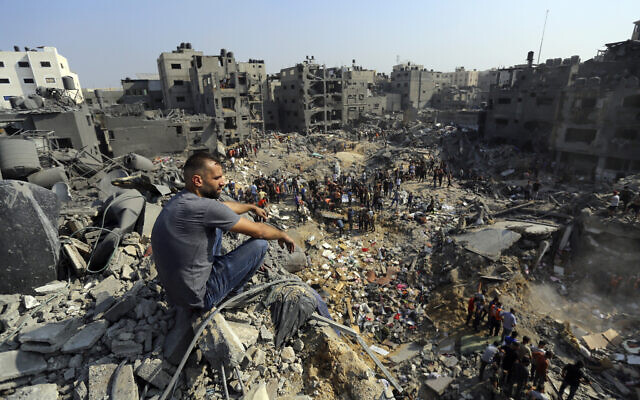
Israel has agreed to formalize and broaden localized pauses in the IDF’s fighting in Gaza for the first time since the outbreak of the war against Hamas, a senior Israeli official told The Times of Israel on Thursday.
The “tactical, localized” pauses that Israel agreed on Thursday to implement each day will build on the humanitarian corridor that it began operating on Sunday to allow Gazans to evacuate from northern to southern Gaza, away from the most intense areas of fighting, the senior Israeli official said, speaking on condition of anonymity.
Since Sunday, the IDF has been holding its fire along the humanitarian corridor on most days for four to six hours to allow Gazans to evacuate south. It also agreed to humanitarian pauses on Oct. 20 and 22nd in order to allow for the safe passage of two pairs of hostages that were released by Hamas.
The new four-hour pauses will take place in a different northern Gaza neighborhood each day, with residents notified three hours ahead of time. They will be able to use this time to either evacuate to the south via the two humanitarian corridors that Israel has established or leave their homes in order to restock on food, medicine and other aid, the senior Israeli official said.
The neighborhoods chosen for the pauses will only be publicly announced shortly ahead of time in order to prevent Hamas from exploiting them for military purposes, the senior Israeli official added.
Prime Minister Benjamin Netanyahu confirmed later Thursday that Israel has agreed to implement pauses in specific parts of northern Gaza to allow Palestinian civilians to evacuate.
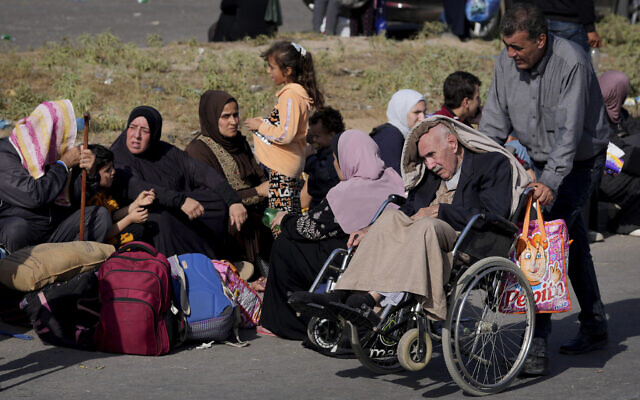
“The fighting continues against the Hamas terrorists, but in specific locations for a given period of a few hours… We want to facilitate a safe passage of civilians away from the zone of fighting, and we’re doing that,” Netanyahu told Fox News.
The premier continued to avoid using the “humanitarian pause” term being employed by the Biden administration, in an apparent effort to downplay a concession seen as less palatable to many Israelis, as long as Hamas continues to hold hostages. But a senior Israeli official who briefed The Times of Israel acknowledged that formalized humanitarian pauses are exactly what Jerusalem agreed to.
Netanyahu also reiterated that Israel will not agree to a more long-term ceasefire until the hostages are released.
The more formalized pauses were first announced earlier Thursday during a phone briefing White House National Security Council spokesperson John Kirby held with reporters, and they came after roughly two weeks of pressure from the Biden administration.
Shortly after Kirby’s comments began making headlines, Netanyahu’s office issued a statement declaring that the IDF’s fighting is continuing and that there will not be any “ceasefire” without a return of the hostages. The Hebrew statement appeared to be geared toward the Israeli domestic audience where there is less of an appetite for considerations regarding the humanitarian situation of Palestinians so long as some 240 hostages remain in Gaza, especially if those decisions are seen as the result of an American pressure campaign.

But a second Israeli official told The Times of Israel that Kirby’s remarks had been coordinated with Netanyahu’s office ahead of time and that Washington was “not surprised” by the premier’s effort to downplay the announcement.
Netanyahu’s office did reiterate that the IDF had on Sunday opened a humanitarian corridor for Gazans to flee south, that roughly 50,000 did so on Wednesday and that the rest of the enclave’s population is urged to follow suit.
A White House official acknowledged to The Times of Israel that some humanitarian pauses have already taken place throughout the war but stressed that the development announced by Kirby amounted to a more “formalized and expanded” plan.
“Of course, if Hamas takes advantage of these pauses to initiate combat activities or fire rockets, IDF said they will take action in response to the origin of the threat,” the White House official added.
Israel also agreed to open a second north-to-south humanitarian corridor along the Gaza coast in addition to the one it’s been operating since Sunday, which is located further inland on the Salah a-Din road, the White House official said.
“We’re seeing people move, tens of thousands, even though there is pressure from Hamas not to let them go,” IDF spokesperson Richard Hecht told reporters on Thursday.
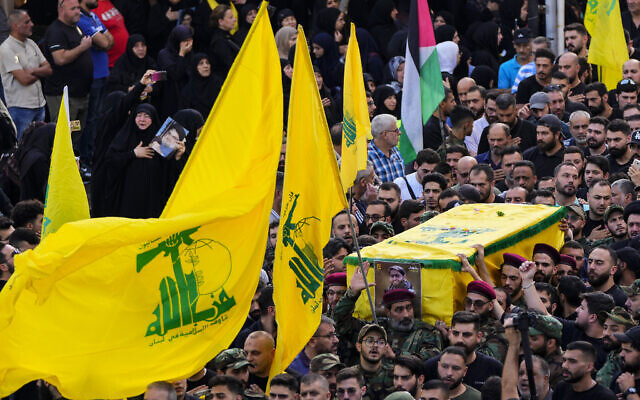
The Israeli decision to formalize and broaden the humanitarian pauses in Gaza was welcomed by U.S. President Joe Biden.
“These pauses will help get civilians to safer areas away from active fighting. They are a step in the right direction,” Biden wrote on X, using the same statement that was issued earlier today by White House National Security Council spokesperson John Kirby.
“You have my word: I will continue to advocate for civilian safety and focus on increasing aid to alleviate the suffering of the people of Gaza,” Biden added.
Further regurgitating the earlier statement from Kirby, Biden also said, “Let me be clear: Israel makes its own decisions.”
“They are fighting an enemy embedded in the civilian population, which places innocent Palestinian people at risk. They have an obligation to distinguish between terrorists and civilians and fully comply with international law,” he said.
While the Biden administration hailed the announcement as a result of its intensive diplomatic engagement with Israel, the president told reporters before boarding Marine Force One that he still has been pushing Netanyahu to agree to a pause that would be days long, not hours.
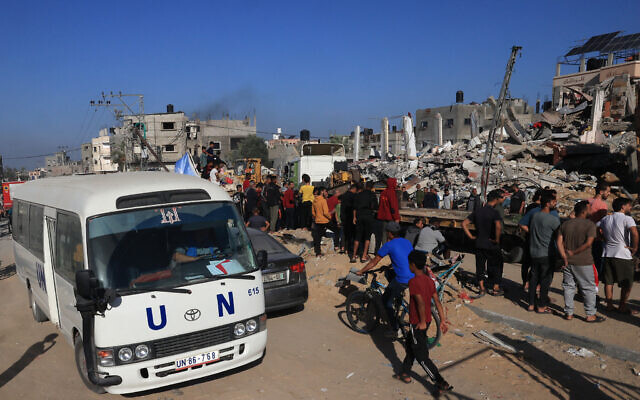
Asked whether he had urged Netanyahu to agree to a three-day pause in exchange for the release of some of the hostages, Biden confirmed that he had while adding that he also had asked Netanyahu to agree to a pause that would be even longer than three days.
Asked whether he’s frustrated with Netanyahu, Biden responded: “It’s taken a little longer than I hoped.”
Biden clarified, though, that there is “none, no possibility” of a more permanent ceasefire, which Washington says would benefit Hamas.
A U.S. official told The Times of Israel last week that Washington recognizes that Hamas will also try and use humanitarian pauses to regroup but argued that Israel will still be able to take steps to limit this.
Pauses are needed to allow for Gaza terror groups to get a full accounting of the roughly 240 hostages, which is necessary to advance negotiations for a more widescale release, the U.S. official added.
According to Israeli estimates, Hamas currently holds around 180 hostages, Palestinian Islamic Jihad holds roughly 40 hostages and unaffiliated mob families are believed to hold an additional 20, complicating negotiations significantly, as the Qatari mediators’ contacts are largely with Hamas’s political leaders abroad, who have largely been sidelined by the terror group’s military leaders still in Gaza, the Israeli official said.
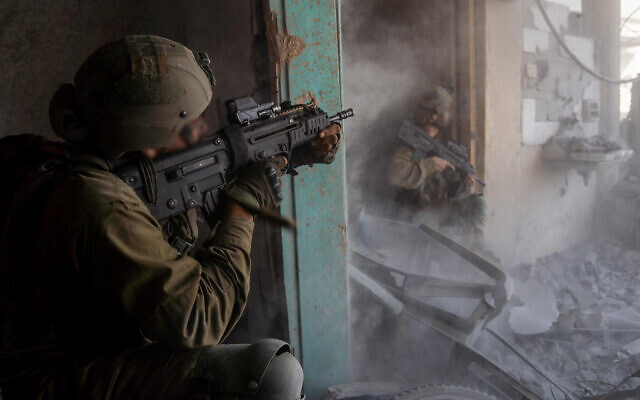
War broke out after Hamas’s devastating onslaught in southern communities on Oct. 7, when some 3,000 Hamas terrorists stormed into Israel from Gaza, killing some 1,400 people and taking at least 245 hostages, making it the deadliest day in Israel’s history. Israel has since launched an offensive against Hamas and vowed to eliminate the terror group.
The Walla news site reported that in their call Monday, Biden tried to convince Netanyahu to agree to a three-day humanitarian pause, which would begin with the release of 10 to 15 hostages. The three days would then be used by Hamas to compile a full list of all the hostages, which would be passed along to Qatari mediators.
Netanyahu rejected the offer, saying that he didn’t trust that Hamas would be willing to release a large number of hostages and that it would suffice with releasing very small numbers while Israel would have a much harder time relaunching its fighting after three days due to international pressure that would surely mount, Walla reported.
Biden said Thursday that Washington was “still optimistic” regarding efforts to release the hostages. “We’re not going to stop until we get them out.”



comments